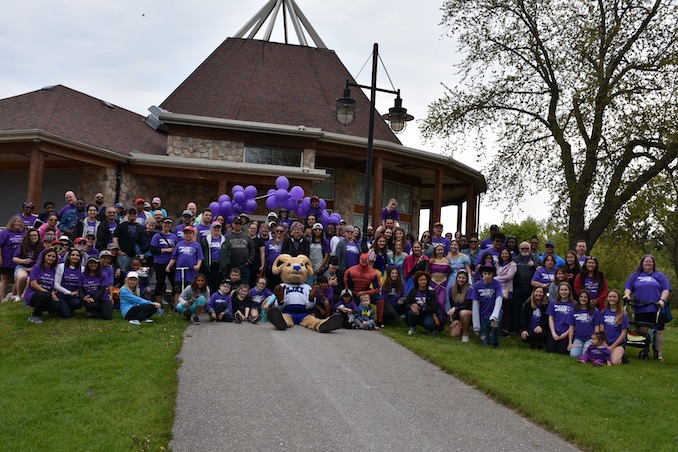For this week’s Charitable Choices, we take a look at Lupus Ontario – a Canadian organization that supports lupus patients across Canada. We spoke with Linda Keill, President at Lupus Ontario, to find out more about what they do.

Describe your charity/non-profit in a few sentences.
Lupus Ontario is the largest Canadian Provincial organization dedicated to improving the lives of lupus patients and provides support services to hundreds of lupus patients and their families. It is estimated that 1 in 1000 Canadians are impacted by lupus. Ninety per cent of people stricken with the disease are women in the prime of their lives. Lupus Ontario looks to increase awareness and education around the disease and to fund research through the annual Lupus Ontario Geoff Carr Research Fellowship to help support the lupus community.
What problem does it aim to solve?
Lupus is a relatively unknown, complex and misunderstood disease. There is a lack of research money for lupus and a lack of resources to diagnose and treat the disease. Lupus Ontario strives to educate the lupus community by providing factual information that helps them access services and manage the disease more effectively. The annual Lupus Ontario Geoff Carr Fellowship trains a physician to become an expert in diagnosing and treating lupus and they are required to complete a lupus related research project.
When did you start/join it?
I became involved in Lupus Ontario about ten years ago. I myself am a lupus patient and I recognized the challenges of a small charity representing a relatively unknown disease. I could also see the need for more awareness and better information for the general public and for the lupus community.
What made you want to get involved?
As a lupus patient, I realized that there was a lot of information on the internet but much of it was confusing and not factual. I was fortunate in having access to good medical care through my journey, but doctors do not have a lot of time to spend coaching patients on lifestyle changes, services available to them, etc. It was also disappointing that the search for better treatments and a cure was progressing so slowly.
What was the situation like when you started?
Lupus Ontario was just starting to use digital communications. Our patient support groups were all in person, our newsletters were all hard copy with limited distribution and we did not have a social media presence. There had been no new treatments for lupus for many years and many of the existing treatments had severe side effects.
How has it changed since?
Lupus Ontario is now capable of reaching a wide audience through digital newsletters, our website, online support groups, online webinars and social media. We now have people attending from remote areas of Ontario and also from other provinces and sometimes other countries. Our webinars are presented by experts in their field and give participants the option to ask questions. As for treatments and lupus research, there has been one new drug approved in Canada and there are several in the pipeline. The research done by the Fellows funded by Lupus Ontario has led to improvements in predicting outcomes and managing lupus. Lupus Ontario, through our annual research Fellowship, has also supported the funding of training lupus specialists who are now caring for patients in Ontario and around the world.
What more needs to be done?
Although awareness and treatments for lupus has greatly improved over the past few decades, there are still many more areas to focus on. Lupus Ontario needs to increase advocacy to get better support and services for lupus patients. Since lupus is a disease that often goes in and out of remission, it is not always recognized for disability programs and other government supports. Employers need to be educated about the disease so they understand that their employees who have lupus can be accommodated and still make a significant contribution in the workforce. We need to continue to support lupus research which is the key to overcoming this devastating disease.
How can our readers help?
There is still very little known about lupus, so helping raise awareness is really helpful for the lupus community. There are several ways people can help, like getting involved with Lupus Ontario and becoming an ally to those who live with this condition every day. During the month of May, it is helpful to share posts on social media to help educate others and on Friday, May 21st, we’re encouraging everyone to Put on Purple for Lupus. This helps spark a conversation about the disease. In addition to that, there are varying degrees of involvement which include, volunteering, hosting a fundraiser, attending a health symposium or support group and of course, donations are always welcome as well. You can also sign up for a free membership in Lupus Ontario by going to https://www.lupusontario.org/membership/. A greater number of members helps us in our advocacy efforts and you will receive our monthly digital newsletter plus advance notice of other events.
Do you have any events coming up?
We do! We will be hosting the Virtual Walk for Lupus Ontario again this year. Walk locations have been established in several communities around the province already and we have also included a Virtual Walk for Lupus Ontario option if your area is not featured. We have identified August 21st as the official day of the walk, however, due to the virtual nature, you can do your walk at the time most convenient for you. More information on the walk can be found at www.walkforlupusontario.org. Additionally, we host frequent education webinars and support sessions each month. The latest can be found at lupusontario.org/events.
Where can we follow you?
• Instagram: @LupusOntario
• Facebook: @LupusOntarioOfficial
• Website: lupusontario.org
PAY IT FORWARD: What is an awesome local charity that you love?
Lupus patients are often afflicted with other diseases including Sjogrens Syndrome and Scleroderma. We would like to give a shout out to the Scleroderma Society of Ontario and the Sjogrens Society of Canada for all the work they are doing to support patients with these disabling conditions.



